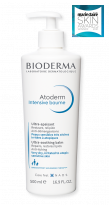How do you treat atopic eczema?
It’s important to treat atopic eczema as early as possible, whether for a child or an adult. Dermatologists have effective treatments to improve patients’ daily comfort. Short-term priority is focused on soothing itching, whereas in the long term the objective is to space out flare-ups.
Emollient care to moisturise skin and provide lipids
This is the simple and basic way to prevent flare-ups. If your skin is atopic, it’s important to apply an emollient specially formulated for your skin, all over your body, twice a day. The daily application soothes itching. Over the long term, it moisturises skin and furnishes the lipids it’s lacking, to restore its barrier function and space out relapses. Be sure to also use a gentle cleanser that doesn’t irritate skin, such as a shower oil. Finally, it’s always a good idea to be careful with any other cosmetic products that you use, as they may make your skin react.
Local, medical creams by prescription
When your skin has flare-ups, you still need to continue applying your moisturising cream all over, in addition to a cortisone-based cream that you apply to red and itchy patches, as soon as the first symptoms appear. With each new application, the patches get better, and their size diminishes – as well as the amount of topical steroid that you apply. By gradually reducing the amount you use, you avoid a rebound effect when you stop the treatment. Generally speaking, secondary effects brought on by the use of topical corticosteroids during atopic dermatitis are very rare, as long as you properly follow the doctor’s prescription.
Good habits
- Take short showers using warm or even cold water, every other day during a flare-up. Avoid baths.
- After a workout, wash away all perspiration in the shower.
- Wash your hands in cold or warm water, never hot, using the same product as you use in the shower.
- Choose a laundry detergent that your skin tolerates, and soft textiles that don’t irritate it.
- Air out your residence everyday, unless it’s pollen season.
- Do relaxing activities that you enjoy to help lower stress and improve your mood. Contact specialised patient and service associations to find help and keep a positive attitude, the best way to keep your eczema under control!
- There is also contact dermatitis, which can be one of two types: irritative contact dermatitis or, more rare, allergic contact dermatitis.



















